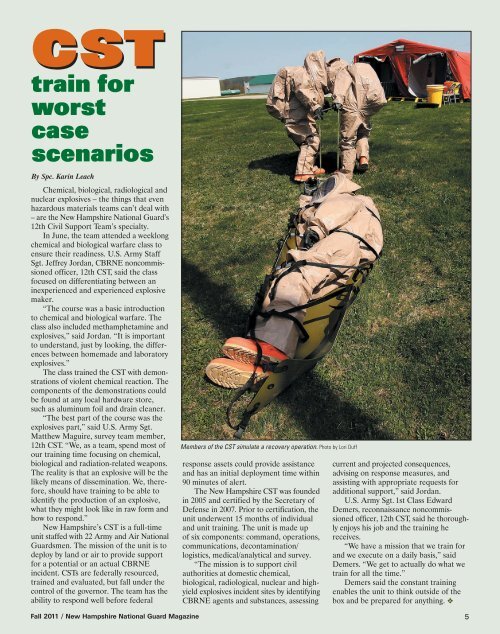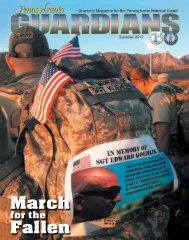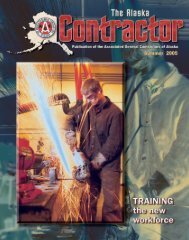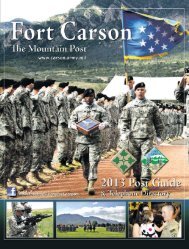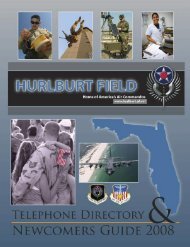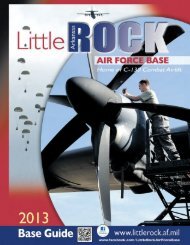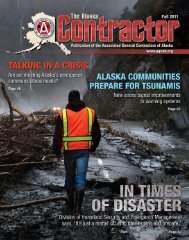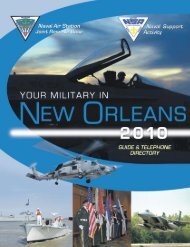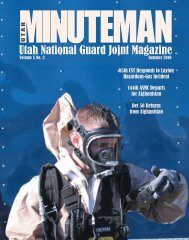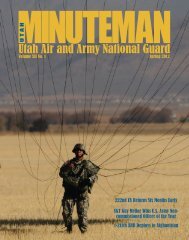New Hampshire National Guard Magazine - Fall 2011
New Hampshire National Guard Magazine - Fall 2011
New Hampshire National Guard Magazine - Fall 2011
You also want an ePaper? Increase the reach of your titles
YUMPU automatically turns print PDFs into web optimized ePapers that Google loves.
CST<br />
train for<br />
worst<br />
case<br />
scenarios<br />
By Spc. Karin Leach<br />
Chemical, biological, radiological and<br />
nuclear explosives – the things that even<br />
hazardous materials teams can’t deal with<br />
– are the <strong>New</strong> <strong>Hampshire</strong> <strong>National</strong> <strong>Guard</strong>’s<br />
12th Civil Support Team’s specialty.<br />
In June, the team attended a weeklong<br />
chemical and biological warfare class to<br />
ensure their readiness. U.S. Army Staff<br />
Sgt. Jeffrey Jordan, CBRNE noncommissioned<br />
officer, 12th CST, said the class<br />
focused on differentiating between an<br />
inexperienced and experienced explosive<br />
maker.<br />
“The course was a basic introduction<br />
to chemical and biological warfare. The<br />
class also included methamphetamine and<br />
explosives,” said Jordan. “It is important<br />
to understand, just by looking, the differences<br />
between homemade and laboratory<br />
explosives.”<br />
The class trained the CST with demonstrations<br />
of violent chemical reaction. The<br />
components of the demonstrations could<br />
be found at any local hardware store,<br />
such as aluminum foil and drain cleaner.<br />
“The best part of the course was the<br />
explosives part,” said U.S. Army Sgt.<br />
Matthew Maguire, survey team member,<br />
12th CST. “We, as a team, spend most of<br />
our training time focusing on chemical,<br />
biological and radiation-related weapons.<br />
The reality is that an explosive will be the<br />
likely means of dissemination. We, therefore,<br />
should have training to be able to<br />
identify the production of an explosive,<br />
what they might look like in raw form and<br />
how to respond.”<br />
<strong>New</strong> <strong>Hampshire</strong>’s CST is a full-time<br />
unit staffed with 22 Army and Air <strong>National</strong><br />
<strong>Guard</strong>smen. The mission of the unit is to<br />
deploy by land or air to provide support<br />
for a potential or an actual CBRNE<br />
incident. CSTs are federally resourced,<br />
trained and evaluated, but fall under the<br />
control of the governor. The team has the<br />
ability to respond well before federal<br />
<strong>Fall</strong> <strong>2011</strong> / <strong>New</strong> <strong>Hampshire</strong> <strong>National</strong> <strong>Guard</strong> <strong>Magazine</strong><br />
Members of the CST simulate a recovery operation. Photo by Lori Duff<br />
response assets could provide assistance<br />
and has an initial deployment time within<br />
90 minutes of alert.<br />
The <strong>New</strong> <strong>Hampshire</strong> CST was founded<br />
in 2005 and certified by the Secretary of<br />
Defense in 2007. Prior to certification, the<br />
unit underwent 15 months of individual<br />
and unit training. The unit is made up<br />
of six components: command, operations,<br />
communications, decontamination/<br />
logistics, medical/analytical and survey.<br />
“The mission is to support civil<br />
authorities at domestic chemical,<br />
biological, radiological, nuclear and highyield<br />
explosives incident sites by identifying<br />
CBRNE agents and substances, assessing<br />
current and projected consequences,<br />
advising on response measures, and<br />
assisting with appropriate requests for<br />
additional support,” said Jordan.<br />
U.S. Army Sgt. 1st Class Edward<br />
Demers, reconnaissance noncommissioned<br />
officer, 12th CST, said he thoroughly<br />
enjoys his job and the training he<br />
receives.<br />
“We have a mission that we train for<br />
and we execute on a daily basis,” said<br />
Demers. “We get to actually do what we<br />
train for all the time.”<br />
Demers said the constant training<br />
enables the unit to think outside of the<br />
box and be prepared for anything. ❖<br />
5


